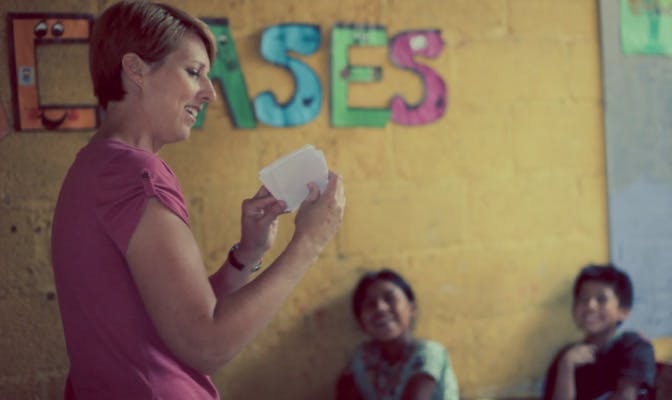
¿No habla español? No hay problema!
Although Spanish language ability is not a prerequisite to participate on the majority of our Latin American projects, you will inevitably encounter a language barrier when interacting with others. At some point you’re going to find yourself improvising sign language, inventing new Spanglish words, spontaneously pulling out some “pictionary” skills, or breaking into some form of interpretative dance. You may find yourself surprised with how naturally it evolves and how smoothly everything comes together.
Nevertheless, it’s normal and acceptable to experience moments of frustration. While volunteering can be fun and uplifting, it’s important to understand that challenges to your comfort zone - and the willingness to step out of it - will always be an integral part of the experience (often, that’s when volunteering becomes the most rewarding). Being a great volunteer starts at home, by ensuring you’re mentally prepared. Managing your own expectations and come prepared to surmount language and cultural barriers with positivity, patience and respect can be the first step toward having the experience of a lifetime.
The age and ability of the individuals with whom you find yourself interacting with will vary greatly, along with the context of the interaction. To a large extent, this will be dependent on the project that you have chosen. For example, entertaining younger children on a Childcare project requires different communication skills than teaching or tutoring adults. Shadowing doctors or providing physical therapy care on Medical/Special Needs Care/Elderly Care projects, may require that you communicate less with patients or individuals in care facilities, but more with the placement staff that you’ll be learning from and assisting. More immersive community projects may provide the opportunity to work in collaboration with local teams and fellow volunteers.

No one’s asking you to master a new language overnight or become bilingual. Our local teams provide volunteers 24/7 support, comprehensive orientations, and often have their own tricks, tips, and resources to share too. Plus, the details you provide in your will also eventually assist us in ensuring that project placements are matched to your level of skills and experience, as well as can be.
However, learning some basic words, phrases, greetings and pleasantries can definitely help to enhance your cultural experience. Volunteers are offered the opportunity to sign up for Spanish language lessons at their program orientation (make that Portuguese lessons if you’re in Brazil!) and some of our local teams will even arrange Skype lessons in advance, for those wanting to brush up on their language skills prior to arrival! Language lessons are paid for in addition to the volunteer program fees and while optional, we strongly encourage participation as it is a wonderful compliment to your cultural exchange and personal education.

In the meantime, our Latin American Program Managers have put together some basic phrases which may be of use when working with children. We invite you to give them a go and reach out to your Program Manager if you’re interested in learning more!
Above all, remember that attitude is usually more important than talent and when in doubt - smiles and laughter are both universal and contagious.
For more information about our projects in Latin America, pleaseexplore our Central American and South American destinations.
Getting to know each other
- Buenos días! ¿Cómo estás? Good morning! How are you?
- ¿Cómo te llamas? ¿Cuántos años tienes? What’s your name? How old are you?
- ¿Quieres jugar conmigo? Do you want to play with me?
Helping a child to focus
- Cálmate. Esta bien. Tu eres un(a) buen(a) chico(a). Calm down. It’s okay, you are a good boy/girl.
- Este tranquilo, por favor. Comportamos bien y nos caemos bien. Calm down, please. We behave well and get along with each other.
- Tengas cuidado, puedes lastimarte. Be careful, you could hurt yourself.
- Vuelve al grupo. Nos estamos divertiendo. Come back to the group. We are having fun.
Helping a child to understand and empathize
- Si me pegas, me duele, me siento triste, y quieres verme feliz, no? If you hit me, it hurts me, and I feel sad, and you want me to feel happy, right?
- Todos compartimos, es muy lindo compartir. We share everything, it’s very nice to share.
- Ten cuidado, al niño le duele / a mí me duele. Be careful, that hurts the child /that hurts me.
Encouraging positive behavior
- Los otros niños miran, tú debes dar un buen ejemplo para todos, especialmente para los más pequeños. The other kids are watching. You should be a good example for them, especially for the younger children.
- Resolvemos nuestros problemas con palabras no violencia. We solve our problems with words not violence.
- Por favor ponga la basura en su lugar. Please put trash in its place.
Helping children to share with each other
- Si ustedes no comparte, yo tomaré el juguete. If you do not share, I will take away the toy.
- Tu puedes jugar durante diez minutos y después, el puede jugar por diez minutos. You can play for ten minutes and after, he can play for ten minutes.
- Ustedes pueden jugar juntos con el juguete. You can play with the toy together.
- Por favor compartimos. Please share.
Positive reinforcement for children
- Estoy orgulloso de ti. Eres un(a) buen(a) niño(a). I am proud of you! You are a good boy/girl!
- ¡Bien hecho! Well done!
If you are looking for a project where you’ll be able to roll up your sleeves and dig in with less of a focus on language then you should consider the Environment and Conservation, Wildlife and Animal Care, Construction and Renovation projects.

